 By Michael McCarthy
By Michael McCarthy
Certainly it doesn’t look like much sitting forlornly on the factory grounds of Britco Structures in Langley, but the story of the opening of the new First Nations library in Old Massett is as fascinating as some of the books that will be available on loan from the library. As far as I can patch them together from various sources, the “behind the scenes” developments that go into the delivery of these modules read like the plot of a mystery novel.
Britco Structures has been at the forefront of the entire literacy project, originally offering to donate a 40 by 12-foot module left over from the 2010 Olympic Games, where it was used as a broadcast facility. The modules are put together at the factory in Langley. How they finally end up in places as remote as Old Massett is a different story.
A relationship must first develop between a First Nation (usually in a remote area) and a partnering Rotary Club, always located in a town or city. Rotary clubs are autonomous and thereby choose their own projects, staffed by volunteers, who are often small business owners. Their partners are First Nations people living far from their partnering towns. An example is North Vancouver Lionsgate club partnering with Oweekenno. In many ways it’s a marriage of opposites.
These two groups need to agree to work together on a specific project. That project is usually a library, although some projects may go in different directions, like the proposed 4-season sportsplex planned for Oweekeno (Rivers Inlet) designed by architect Scott Kemp. The UBC School of Dentistry in Point Grey is another partner, volunteering their interns’ services every year from their campus at UBC and traveling to First Nations territory as far afield as the Chilcotin.
These unique relationships would not be possible without the spark provided by former B.C. Lieutenant-Governor Steven Point, who resides in Chilliwack but worked from Government House in Victoria during his tenure. Point made aboriginal literacy a priority during his term in office, an initiative continued by current Lt. Gov. Judy Guichon and the Government House Literacy Foundation in Victoria. Are you following the partners and geography so far? It gets even more complex.
Point’s aide de camp during his term of office was Bob Blacker, a Rotarian and formerly District Governor of Rotary District 5040, comprised of approximately 100 Rotary clubs in B.C. and northern Washington. Blacker lives in Richmond, a suburb of Vancouver, but frequently travels with the Lt. Governor to various events around the province. When Point mentioned his interests in aboriginal literacy, Blacker stepped in to offer his Rotary contacts. After all, just like McDonalds, it seems there is a Rotary club in every town in North America, so now you have a distribution network all set up, and operated by professionals.
OK, so you have a 40-foot module sitting at a factory in Langley, and a request for a library in Old Massett (or the Chilcotin, or any remote village up and down the B.C. coast), so how do you get the library stocked with books and shipped to its destination? Apparently there is a group Blacker calls his LRTs, the Library Rapid Response Team of professional librarians led by Bonnie Sutherland, another Rotarian, who specializes in delivering computers and books to projects in Africa, a project named Afretech, of which I need to learn much more very soon because Bonnie is an expert in these kinds of aid projects. These librarians, upon request, fly into action and choose the books and create an archiving system on the computer, just like any library, although in the instance of Old Massett the elders of that community may have chosen the books. More to learn.
Once the books are stocked, then the 40-foot module has to find its way to its destination. The very first module was trucked by Britco, at the company’s expense, to the Chilcotin. (I think it was the Stone band at Anaham, but I need to check; could have been the Toosey folks at Riske Creek). But getting a module shipped to Old Massett is like sending a space rocket to Mars. Easy in theory, but there are expenses and other logistical difficulties involved. How’s your geography doing so far?
Enter B.C. Ferries. Certainly they have ships that make the run up the Inside Passage, ferries that can take a 40-foot module, but it’s an expensive route to operate. Calls and discussions took place and evidently BC Ferries checked out the Write to Read Project and decided that it, too, wanted to become a partner. So, as of today, BC Ferries has absorbed the shipping costs of the module and the tractor trailer on which it sits to its dock in Skidegate, which is located on the south end of Graham Island in Haida Gwaii. Get out your map and check where it is, because we are still not in Old Massett.
Britco driver Ron Fisher will then drive the rig up the island to its intended destination in the village of Old Massett, which is tribal territory located just to the west of the town of Massett. Evidently the town of Massett has an airport, but how do you get a semi-trailer loaded on to a plane? No, somebody has to drive it here, so kudos to Ron for that.
On the other end, if I can track everyone involved by following a trail of emails, it’s the Old Massett Village Council that got the ball rolling, with Beng Favreau of Literacy Haida Gwaii coordinating efforts. They decided on a Sneak Peek Event where the community was invited to come help select the books they would love to see in the library. Some books have already ordered and loans of aboriginal books and resources (digital and print) have been requested that will be used as sample books for future browsing and selection. Books with a focus on aboriginal themes and authors.
The library will be somewhat ready, though not fully functional, to create some spark and pride in the community before the official opening in October. Lt. Governor Guichon will be on hand for that event, the opening of the best First Nations library (with FN Authors!) in Canada.
Coordinating operations at the Britco end is Vice President of Sales Christoph Neufeld, who will be joined in Old Massett at the official library opening by Britco VP
Chris Gardner. By my estimate Britco has donated almost a dozen modules to the literacy project, materials worth about half a million dollars. That is really the definition of ‘social responsibility.’
It reads like a mystery novel, or a jigsaw puzzle with lots of little pieces that need to be assembled in the right order. I’m still trying to fit all the pieces together and learn the names of all the people involved and who did what. But in the end, First Nations people – some of the finest storytellers in the world with a storied history of oral communications dating back many centuries – will finally get access to what the rest of us in cities and towns consider a simple community right, a library stocked with books and computers. That’s why it’s called the Write to Read project. All based on good faith between multiple partners from different walks of life all agreeing to work together for the benefit of everyone. Congrats to all involved.
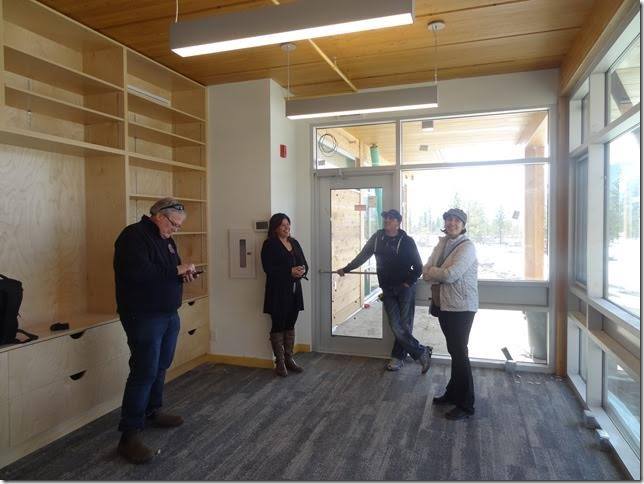
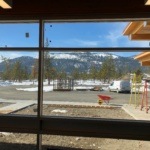
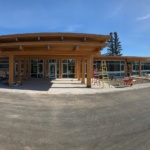
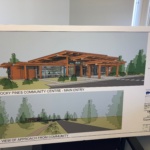
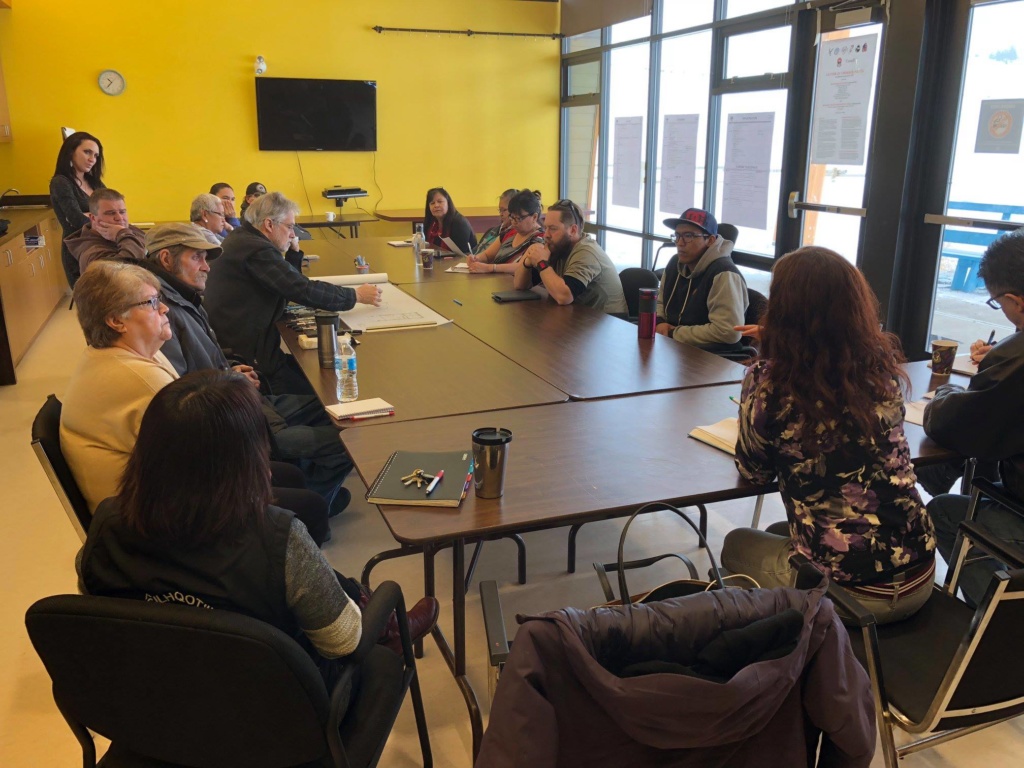 WRITE TO READ MOVING IN DIRECTIONS WE NEVER DREAMED OF 10 YEARS AGO.
WRITE TO READ MOVING IN DIRECTIONS WE NEVER DREAMED OF 10 YEARS AGO.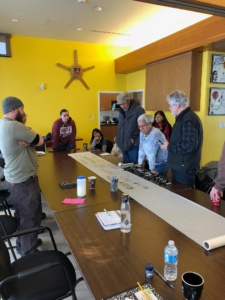 We did not stop there, we are going to train community members with the trades that will allow them to build there own homes. TOOSEY is way ahead in this direction and we feel it can be done………. but one of the best things of this trip was to see an enterprise which is owned by the TOOSEY FN – Chilcotin Plateau Enterprises, who remodelled a school which they use to train FN personal in carpentry trades and more importantly milling skills using a PORTABLE MILL. As a result of our visit we are going to explore how we can partner with CHILCOTIN PLATEAU and run courses for all of our communities who will be using portable mills to cut lumber for their builds…… FIRST NATION training FIRST NATION for FIRST NATIONS……
We did not stop there, we are going to train community members with the trades that will allow them to build there own homes. TOOSEY is way ahead in this direction and we feel it can be done………. but one of the best things of this trip was to see an enterprise which is owned by the TOOSEY FN – Chilcotin Plateau Enterprises, who remodelled a school which they use to train FN personal in carpentry trades and more importantly milling skills using a PORTABLE MILL. As a result of our visit we are going to explore how we can partner with CHILCOTIN PLATEAU and run courses for all of our communities who will be using portable mills to cut lumber for their builds…… FIRST NATION training FIRST NATION for FIRST NATIONS……

